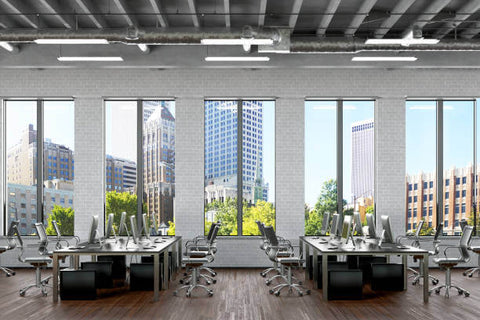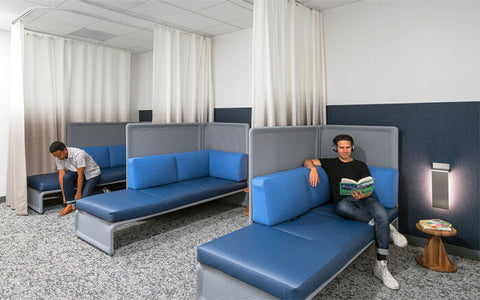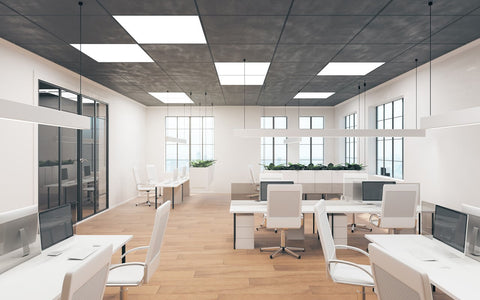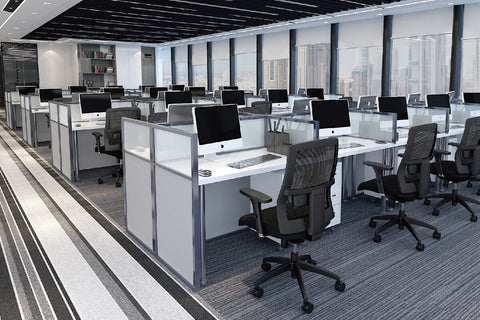5 Office Fitout Design Ideas

Part of the: Office Fitout Collection
How many days have you arrived at work, dreading another day at the same office? You (and your coworkers) have most certainly experienced this at some point. So, how do you motivate people to come to work excited to do their jobs? A brand-new office remodel might be the solution.
Remodelling and updating your company's workplace is easier said than done. The possibilities are endless. The number of office fitout ideas accessible may appear to be infinite. But, how can you increase productivity in your company without spending a fortune?
Here are a few office fitout ideas and considerations to make to build a workspace where employees like working.
Idea 1 — A free-flowing concept that encourages movement
Nothing is worse than a stuffy workplace. You'll have problems hearing your thoughts despite your best efforts! The layout should be the first thing you look at when looking at office fitout ideas.
It is vital to have a layout that promotes movement. This provides for lots of walking space between desks, making it easy for people to move around. Desks should also be placed at a sufficient distance apart so that people may chat without being distracted by the noise of mouse clicks and keyboard pecking. It's also critical to consider social distance requirements while designing your layout.
Idea 2 — Assigning office zones
Creating zones with distinct functions can help to break up the monotony of everyday labor. It also adds vitality and excitement to the workplace. A 'zone' is a room or location designed for a certain function.
These can include, for instance, quiet rooms for concentrated, solo work where people may complete duties without being distracted. These areas may have soothing music, partitioned workstations, and other amenities. You can also have collaborative places, such as meetings, where dialogue and idea exchange are encouraged.
Of course, having break or lunch rooms that are specially meant to disengage you from work is ideal. These areas might be outfitted with games or other leisure activities, such as a pool table or beanbags.
Idea 3 — Sufficient and natural lighting
A smart lighting scheme is part of an effective office redesign. Lighting, in addition to allowing you to see your work, may boost productivity and satisfaction in the office. In actuality, different levels of light can have distinct impacts on productivity and mood.
A warm hue light, such as red or orange, creates a sense of tranquillity, making it excellent for break rooms. Cool colored lights, on the other hand, improve attention, productivity, and reduce fatigue. This illustrates how a well-chosen lighting design may improve overall mood and productivity.
But what about the natural rays of the sun? Natural sunlight has been shown in tests to raise serotonin levels and hence enhance people's emotions. Make sure there is lots of natural light while designing your office.
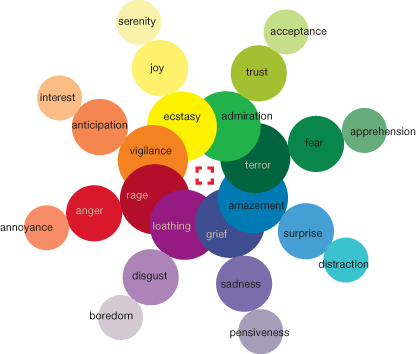
Idea 4 — Apply color psychology
The study of how colors impact people's moods and behavior is known as color psychology. Distinct hues can have different impacts, just as different light intensities might.
White is by far the most widely used color in office interior design. White looks to be refined, pure, and spotless. It also gives your desk a sleek, uncluttered appearance. On the other side, too much white and minimalism may become repetitive, unimaginative, and unappealing.
Because it is smart, secretive, and forceful, black is an authoritative choice for a workplace color scheme. When combined with other colors, it may create an attractive, cool workplace. However, if there is too much darkness, the tone becomes dismal and terrifying. It also absorbs natural light, which is important in workplace design.
Idea 5 — Furniture must serve a purpose
Wouldn't it make sense to invest in practical furnishings if you and your colleagues are going to have to work 8 hours a day, 7 days a week? A sturdy, ergonomic chair may considerably increase productivity. A rickety, wobbly desk may lead it to tumble.
Investing in long-lasting desks, chairs, and accessories are surefire ways to make work more pleasurable. This does not only apply to furniture; the décor of your workplace should also be consistent with the general theme of your interior design. Distracting embellishments or unnecessary art may detract from an otherwise effective workplace.

